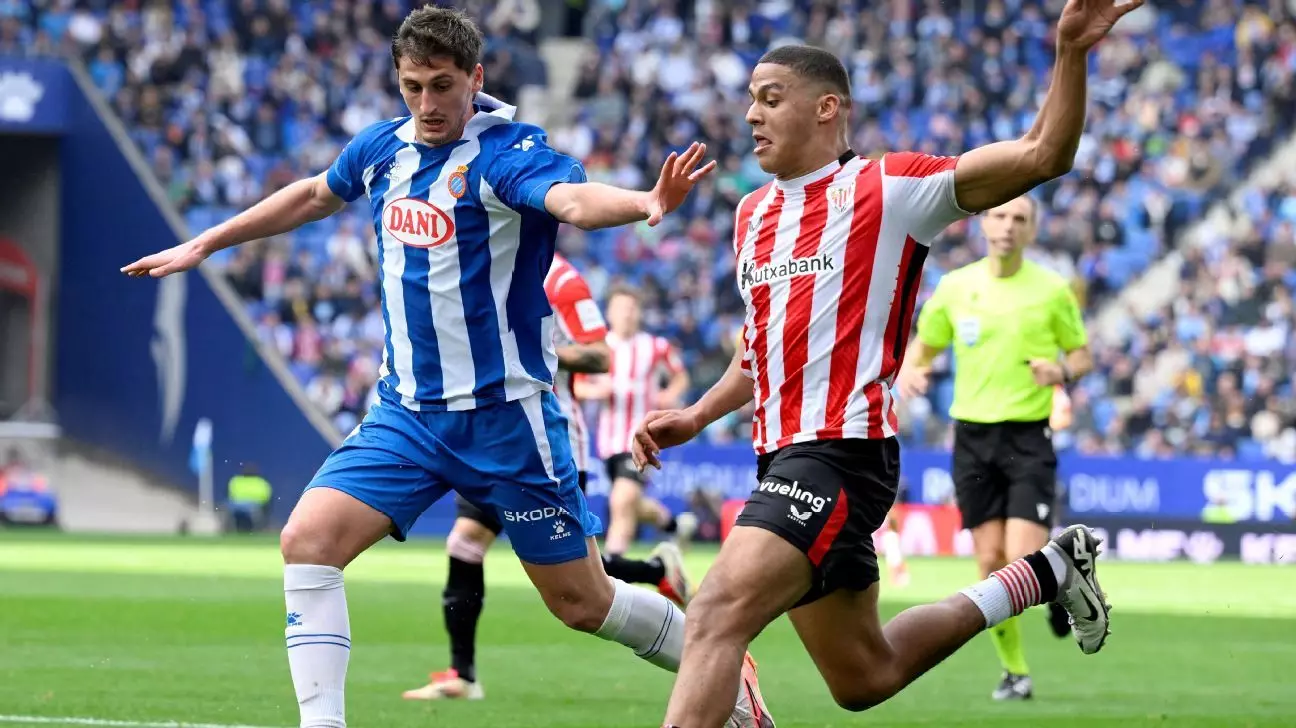The recent LaLiga match between Espanyol and Athletic Club ended in a disappointing 1-1 draw, but it was the alleged racist behavior from some home supporters towards Athletic forward Maroan Sannadi that stole the spotlight. The incident highlighted an ongoing problem within Spanish football—racism—which rears its ugly head not just sporadically but with alarming frequency. As the beautiful game continues to grapple with these deeply-rooted issues, calls for change resonate louder than ever.
During the match, the referee, Guillermo Cuadra Fernández, was compelled to halt play in the 17th minute after Iñaki Williams brought racist chants aimed at Sannadi to his attention. In a commendable move, the referee activated LaLiga’s anti-racism protocol, signaling a clear message that such behavior would not be tolerated. The announcement on the big screens warned fans that further incidents could lead to the temporary suspension or even abandonment of the match. This action was not merely procedural; it was an indication of the seriousness of the allegations.
Williams, who himself has been subject to racial abuse in the past, emphasized the need for enjoyment in football, stating, “These types of things cannot happen.” His words resonate with the experience of many Black players, who strive to perform in a sport where they should feel safe and respected. The incident reflects a climate where a significant portion of the fanbase perpetuates a culture of hate, starkly contrasting with both the game’s spirit and the values that many clubs profess to uphold.
This incident serves as a reminder that racism isn’t an isolated occurrence but rather an endemic issue that spans across various levels of Spanish football. Historically, athletes like Vinícius Júnior, another victim of racially charged taunts, have faced similar vitriol, illustrating a profound culture that seems resistant to change. While both LaLiga and the Royal Spanish Football Federation (RFEF) have put measures in place to combat these issues—such as the stipulation that a match can be stopped if racist actions are reported—the effectiveness of these protocols is often called into question.
Indeed, while regulatory measures have been established, the real challenge lies in their implementation and the societal attitudes that fuel such deplorable behavior. Athletic coach Ernesto Valverde echoed this sentiment by stating that it shouldn’t matter which player was targeted; what matters is fostering an environment where all players can compete without fear of abuse.
In the wake of the incidents, Espanyol issued a statement condemning racism, aligning itself with a growing trend among clubs to distance themselves from hateful behavior. However, statements alone are insufficient. Real action must follow rhetoric for meaningful change to take place. Previous pampering of those found guilty of racial abuse has led to skepticism among fans and players alike regarding the sincerity of such club-led declarations.
Efforts to address racism also often take the form of public relations campaigns, but the question remains: how many actual offenders face consequences? In the past, Espanyol identified supporters who directed racial insults at Williams and immediately handed out stadium bans, showcasing an understanding that punitive actions are vital for accountability. Despite such positive steps, many remain unconvinced that enough is being done to engender lasting change within the sport.
The time has come for a concerted effort from all stakeholders in football—players, clubs, and supporters—to work towards a unified front against racism. This encompasses a cultural shift that goes beyond mere condemnation; it involves fostering a culture of respect and understanding within stadiums and communities. Players like Sannadi and Williams serve as role models, heralding the call for change while expressing their disdain for the status quo.
Moreover, the ongoing support from organizations like LaLiga has potential; their rigorous implementation of policies can inspire genuine hope for a future devoid of racial tensions in football. Nevertheless, fans, too, must engage in self-reflection, recognizing their role in either perpetuating or dismantling these harmful stereotypes.
In essence, the fight against racism in Spanish football cannot be won by individual actions alone. It requires a cohesive movement that includes education, legislation, and passionate advocacy from all corners of the football community. Only then can the sport reclaim its essence, allowing everyone to enjoy the game free from the shackles of hatred.

